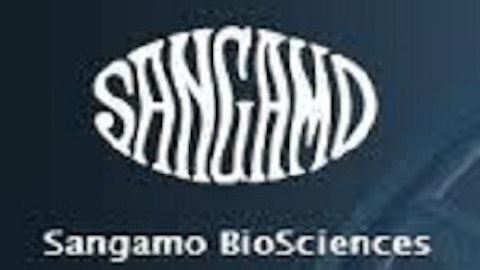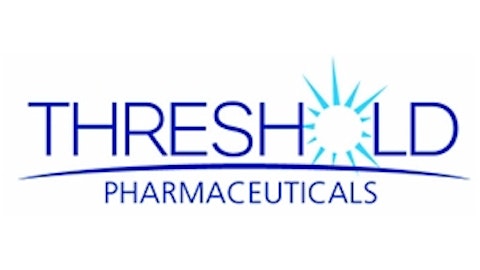– Afinitor: Developed by Novartis AG (ADR) (NYSE:NVS) and also approved in 2011 to treat pNET tumors, Afinitor was tested in a 410 patient trial of which 207 received the new treatment. Afinitor delivered very comparable results with Sutent — progression-free survival of 11 months, compared with just 4.6 months for the placebo. However, an interim analysis done on overall survival when Afinitor was approved in 2011 yielded no statistical significance.
– Tarceva + Gemzar: This drug combo of Roche Holding Ltd. (ADR) (OTCMKTS:RHHBY) and Astellas Pharma Inc (TYO:4503)‘s Tarceva with Eli Lilly & Co. (NYSE:LLY)‘s Gemzar was approved in 2005 as a first-line treatment for metastatic pancreatic cancer. The combination of Tarceva with Gemzar, in trials, delivered a PFS of 6.4 months, compared with six months on the dot for the Gemzar plus placebo arm. In cases of exocrine tumors, this combination is used very frequently.
– Folfirinox: This potent chemotherapy mixture combines 5-FU, leucovorin, irinotecan, and oxaliplatin to treat advanced stages of pancreatic cancer. Folfirinox can be used to treat multiple types of difficult cancers, but low tolerability among patients with advanced disease negates many of the potential PFS benefits it can offer.
Just as we’ve witnessed in numerous other cancer types, while we’ve had successes there has also been quite a slew of failures. Perhaps the most notable in recent history is Clovis Oncology Inc (NASDAQ:CLVS) , which reported in November that its experimental late-stage pancreatic cancer drug CO-101 didn’t provide a statistical benefit over Eli Lilly & Co. (NYSE:LLY)’s Gemzar. The drug was scrapped, and Clovis Oncology Inc (NASDAQ:CLVS) lost its leading drug candidate.
What’s coming down the pipeline
Now that you have a better idea of what the current treatment picture looks like for pancreatic cancer patients, let’s have a look at what’s coming down the pipeline that could revolutionize treatment in the near future.
– TH-302: Developed by Threshold Pharmaceuticals, Inc. (NASDAQ:THLD) and being combined with Gemzar in trials, late-stage study enrollment is currently under way. TH-302 is a DNA alkylator that targets hypoxic cells (those with low oxygen). Healthy cells receive normal blood flow while tumor growth can vary leaving certain areas of the tumor “starved” for oxygen. TH-302 will hone in on these hypoxic cells and target the tumor this way. In mid-stage trials, TH-302 with Gemzar delivered a 41% reduction of risk for disease progression or death while also increasing median-PFS by 2.4 months.
– Abraxane: Celgene Corporation (NASDAQ:CELG)‘s wonder drug Abraxane may be on the path to yet another FDA-approved indication based on its trial results. When combined with Gemzar, Abraxane delivered a median PFS of 8.5 months compared with the Gemzar only placebo, which had a median PFS of 6.7 months. The risk of death was 28% lower for those taking Abraxane in trials, yet after two years, just 9% of patients in the Abraxane + Gemzar trial arm were still alive.
Your best investment
If we’ve learned anything from this romp through pancreatic cancer treatments, it’s that we need all the new treatments and research dollars we can get. Clearly, PFS is improving with many ongoing trials, but we’re still a long way from having any semblance of control over pancreatic cancer.
From an investment perspective, I think both experimental candidates hold the most promise in the sector, even though Pfizer Inc. (NYSE:PFE), Novartis AG (ADR) (NYSE:NVS), and Roche Holding Ltd. (ADR) (OTCMKTS:RHHBY) all have an FDA-approved drug already on the market.
Threshold Pharmaceuticals, Inc. (NASDAQ:THLD)’s TH-302 is certainly one of the most exciting cancer-fighting agents imaginable. Being able to target hypoxic cells TH-302 should leave healthy cells relatively intact, and it could hold promise across a bunch of different cancer types — not just pancreatic cancer. Understandably, a lot is riding on TH-302 for Threshold Pharmaceuticals, Inc. (NASDAQ:THLD), so the risk versus reward is incredibly high here, and only the most biotech savvy investors should even consider this as a viable investment.
Celgene Corporation (NASDAQ:CELG), however, has a well-established pipeline of which Revlimid and Abraxane are its core. Abraxane, which is already approved as a first-line treatment for non-small-cell lung cancer and as a treatment for metastatic breast cancer, looks very likely to add pancreatic cancer to the list. Celgene Corporation (NASDAQ:CELG) offers one of the most balanced portfolios among biotechs and would be the conservative investor’s best choice in this space.
Stay tuned next week, when I wrap up this “Tackling Cancer” series by selecting my favorite established and pipeline candidates among the 12 cancer types we’ve examined.
The article Tackling Cancer: Pancreatic Cancer’s Biggest Current & Upcoming Players originally appeared on Fool.com is written by Sean Williams.
Fool contributor Sean Williams has no material interest in any companies mentioned in this article. You can follow him on CAPS under the screen name TMFUltraLong, track every pick he makes under the screen name TrackUltraLong, and check him out on Twitter, where he goes by the handle @TMFUltraLong.The Motley Fool recommends Celgene.
Copyright © 1995 – 2013 The Motley Fool, LLC. All rights reserved. The Motley Fool has a disclosure policy.




